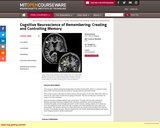
For undergraduates taking Course 9 IAP subjects for credit. See IAP Guide for details.
- Subject:
- Psychology
- Social Science
- Material Type:
- Full Course
- Provider:
- M.I.T.
- Provider Set:
- M.I.T. OpenCourseWare
- Author:
- Wagner, Anthony
- Date Added:
- 01/01/2002

For undergraduates taking Course 9 IAP subjects for credit. See IAP Guide for details.
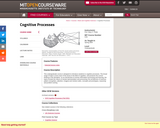
An introduction to human information processing and learning; topics include the nature of mental representation and processing; the architecture of memory; pattern recognition; attention; imagery and mental codes; concepts and prototypes; reasoning and problem solving.
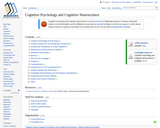
Cognitive Psychology is a psychological science which is interested in various mind and brain related subfields such as cognition, the mental processes that underlie behavior, reasoning and decision making.

How genetics can add to our understanding of cognition, language, emotion, personality, and behavior. Use of gene mapping to estimate risk factors for psychological disorders and variation in behavioral and personality traits. Mendelian genetics, genetic mapping techniques, and statistical analysis of large populations and their application to particular studies in behavioral genetics. Topics also include environmental influence on genetic programs, evolutionary genetics, and the larger scientific, social, ethical, and philosophical implications.

How do individuals and families interface with larger systems, and how do therapists intervene collaboratively? How do larger systems structure the lives of individuals and families? Relationally-trained practitioners are attempting to answer these questions through collaborative and interdisciplinary, team-focused projects in mental health, education, the law, and business, among other fields. Similarly, scholars and researchers are developing specific culturally responsive models: outreach family therapy, collaborative health care, multi-systemic school interventions, social-justice-oriented and spiritual approaches, organizational coaching, and consulting, among others. This course explores these developments and aims at developing a clinical and consulting knowledge that contributes to families, organizations, and communities within a collaborative and social-justice-oriented vision.

" Explore the future through modeling, reading, and discussion in an open-ended seminar! Our fields of interest will include changes in science and technology, culture and lifestyles, and dominant paradigms and societies."
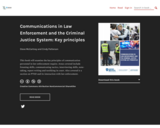
The ability to communicate is critical to those who work in law enforcement. This book will examine the key principles of communication personnel in law enforcement require. Areas covered include listening skills, communicating tactics, interviewing skills, note-taking, report writing and testifying in court. Also covered is a section on PTSD and its interaction with law enforcement. Key here is that police officers should understand the relationship between PTSD and the need to communicate with others in seeking help and assistance. The book concludes with a section on the history of women in policing. It is the belief of the authors of this book, that women have played an enormous role in developing the communication within policing and have advanced the narrative of a more inclusive approach to communication.

Small-group study of advanced subjects under staff supervision. For graduate students wishing to pursue further study in advanced areas of urban studies and city and regional planning not covered in regular subjects of instruction. 11.941 and 11.955 are taught P/D/F.
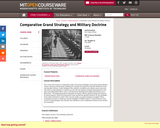
A comparative study of the grand strategies and military doctrines of the great powers in Europe (Britain, France, Germany, and Russia) from the late nineteenth to the mid-twentieth century. Examines strategic developments in the years preceding and during World Wars I and II. What factors have exerted the greatest influence on national strategies? How may the quality of a grand strategy be judged? Exploration of comparative case study methodology also plays a central role. What consequences seem to follow from grand strategies of different types? Open to undergraduates with permission of instructor.
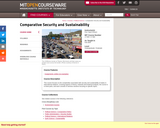
This course focuses on the complexities associated with security and sustainability of states in international relations. Covering aspects of theory, methods and empirical analysis, the course is in three parts, and each consists of seminar sessions focusing on specific topics.
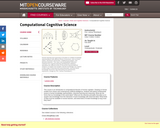
This course is an introduction to computational theories of human cognition. Drawing on formal models from classic and contemporary artificial intelligence, students will explore fundamental issues in human knowledge representation, inductive learning and reasoning. What are the forms that our knowledge of the world takes? What are the inductive principles that allow us to acquire new knowledge from the interaction of prior knowledge with observed data? What kinds of data must be available to human learners, and what kinds of innate knowledge (if any) must they have?
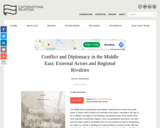
The Middle East’s geographical and strategic uniqueness has made every great power in history to seek to advance its interests in the region. Yet, the region constitutes the greatest single reserve of oil in the world, which has made it a regular source of foreign interference in the post-World War II era. In addition to its geographical and strategic uniqueness, the Middle East is the birthplace and spiritual center of the world’s three most important monotheistic religions. Due to its geopolitical importance, any inter- and intra-state conflict in the Middle East has the potential not only for destabilizing the region as a whole or upsetting the regional balance of power but also affecting global stability. After employing the Regional Security Complex Theory (RSCT) in order to define and delimit the region of the Middle East, the chapters of this book address the question of regional order, examine how regionalism and globalism feature in Middle Eastern integration processes, explore regional bids for hegemony, and investigate the approaches and policies of major international actors.

This course analyzes the development of the United States Congress by focusing on the competing theoretical lenses through which legislatures have been studied. In particular, it compares sociological and economic models of legislative behavior, applying those models to floor decision-making, committee behavior, political parties, relations with other branches of the Federal government, and elections. Graduate students are expected to pursue the subject in greater depth through reading and individual research. This course analyzes the development of the United States Congress by focusing on the competing theoretical lenses through which legislatures have been studied. In particular, it compares sociological and economic models of legislative behavior, applying those models to floor decision-making, committee behavior, political parties, relations with other branches of the Federal government, and elections. Graduate students are expected to pursue the subject in greater depth through reading and individual research.
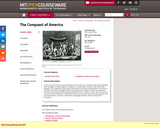
In this course the conquest and colonization of the Americas is considered, with special attention to the struggles of native peoples in Guatemala, Canada, Brazil, Panama, and colonial New England. In two segments of the course-one devoted to the Jesuit missionization of the Huron in the 1630s, the other to struggles between the government of Panama and the Kuna between 1900 and 1925-students examine primary documents such as letters, reports, and court records, to draw their own conclusions. Attention focuses on how we know about and represent past eras and other peoples, as well as on the history of struggles between native Americans and Europeans.

Everyone has their own view of the nature of consciousness based on their education and background. The intention of this book is to expand this view by providing an insight into the various ideas and beliefs on the subject as well as a review of current work in neuroscience. The neuroscientist should find the philosophical discussion interesting because this provides first-person insights into the nature of consciousness and also provides some subtle arguments about why consciousness is not a simple problem. The student of philosophy will find a useful introduction to the subject and information about neuroscience and physics that is difficult to acquire elsewhere.

What we see through our windshields reflects ideas about our national identity, consumerism, and infrastructure. For better or worse, windshields have become a major frame for viewing the nonhuman world. The view from the road is one of the main ways in which we experience our environments. These vistas are the result of deliberate historical forces, and humans have shaped them as they simultaneously sought to be transformed by them. In Consuming Landscapes, Thomas Zeller explores how what we see while driving reflects how we view our societies and ourselves, the role that consumerism plays in our infrastructure, and ideas about reshaping the environment in the twentieth century. Zeller breaks new ground by comparing the driving experience and the history of landscaped roads in the United States and Germany, two major automotive countries. He focuses specifically on the Blue Ridge Parkway in the United States and the German Alpine Road as case studies. When the automobile was still young, an early twentieth-century group of designers—landscape architects, civil engineers, and planners—sought to build scenic infrastructures, or roads that would immerse drivers in the landscapes that they were traversing. As more Americans and Europeans owned cars and drove them, however, they became less interested in enchanted views; safety became more important than beauty. Clashes between designers and drivers resulted in different visions of landscapes made for automobiles. As strange as it may seem to twenty-first-century readers, many professionals in the early twentieth century envisioned cars and roads, if properly managed, as saviors of the environment. Consuming Landscapes illustrates how the meaning of infrastructures changed as a result of use and consumption. Such changes indicate a deep ambivalence toward the automobile and roads, prompting the question: can cars and roads bring us closer to nature while deeply altering it at the same time?
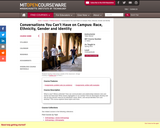
What is race? What is ethnicity? How can communication and relationships between men and women be improved? What causes segregation in our society? How do stereotypes develop and why do they persist? How do an individual's racial, ethnic, and sexual identities form and develop? This course explores these topics and more.

Seminar provides an overview of quantitative and qualitative research methods in the social sciences. Topics covered include: hypothesis formulation and theory construction; data collection techniques (experimental, survey, and observational); ethical issues in research; and how to prepare a research proposal. Goal is to provide students with the methodological skills to evaluate existing studies and to select appropriate methods for use in their own research.
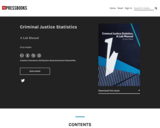
This lab uses statistics and demographic data on the City of Baltimore. We will enter, format, and analyze that data in Microsoft Excel.
Please note: this lab is written for a beginner in Excel and meant to introduce you to various capabilities of Excel. You may feel the need to skip through some steps if you are experienced with Excel, and that is fine. Just make sure you understand the content of the lab! Future work will build on these skills.
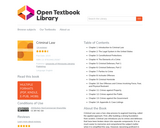
Criminal Law uses a two-step process to augment learning, called the applied approach. First, after building a strong foundation from scratch, Criminal Law introduces you to crimes and defenses that have been broken down into separate components. It is so much easier to memorize and comprehend the subject matter when it is simplified this way. However, becoming proficient in the law takes more than just memorization. You must be trained to take the laws you have studied and apply them to various fact patterns. Most students are expected to do this automatically, but application must be seen, experienced, and practiced before it comes naturally. Thus the second step of the applied approach is reviewing examples of the application of law to facts after dissecting and analyzing each legal concept. Some of the examples come from cases, and some are purely fictional. All the examples are memorable, even quirky, so they will stick in your mind and be available when you need them the most (like during an exam). After a few chapters, you will notice that you no longer obsess over an explanation that doesn’t completely make sense the first time you read it—you will just skip to the example. The examples clarify the principles for you, lightening the workload significantly.